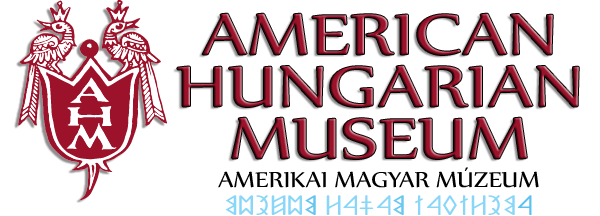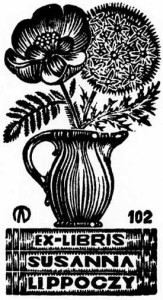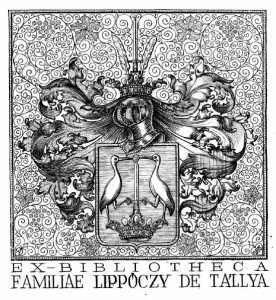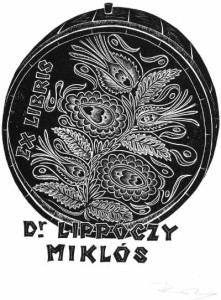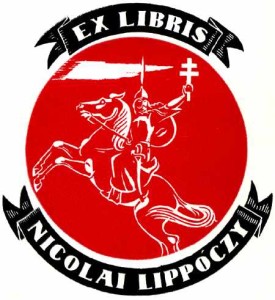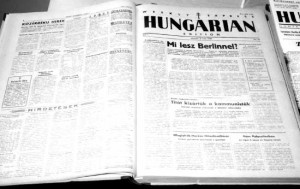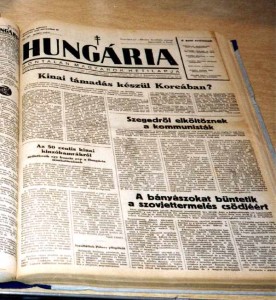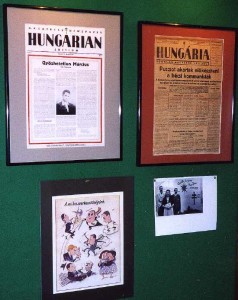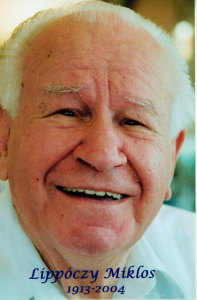
By Susanna Lippóczy Rich
Dr. Nicholas Gabriel Lippóczy was born on Good Friday, March 21, 1913, in Tállya, Hungary, the sixth of Norbert and Anna’s seven children. Dating back to the 16th Century, the Lippóczy family were wine-makers in the fertile Tokay region of Hungary. Especially favored by royal families and the Catholic Church, they were granted a coat of arms in 1556. Nicholas spent an idyllic childhood among his five sisters and the oldest sibling, Norbert, until 1920 when the parish priest, eyes filled with tears, announced the decimation of Hungary by the Treaty of Trianon.
On graduating with a degree in Jurisprudence from the University of Debrecen in 1937, Nicholas served as a jurist in the Ministry of Homeland Defense in Budapest. In 1945, again on a Good Friday, he guided a group of refugee officers’ wives and children to safety in Austria. With his first wife, the former Susanna Szilágyi-Nagy, he founded Hungária, the first newsletter of Hungarian émigrés. The first edition of Hungária appeared in Bad Wörishofen as D.P. Express Newspaper: Hungarian Edition on 30 January 1948, the day Gandhi was assassinated. The first edition named Hungária appeared on 17 September 48, a week before his marriage. Because of his forthright editorial and political, he and his family were subjected to death threats by the Communist regime in Hungary. So Nicholas and Susanna emigrated to the United States July of 1950, and lived a transient life between New York City, Clifton, and finally Passaic, NJ. On the very day he welcomed his first born, Susanna, into the world, Nicholas was offered and accepted the position of editor-in-chief of New York-based Hungarian daily, Népszava, where he revamped and revitalized the operations for two years. In 1960 he married Ilona, built a data processing firm with her, and had two more daughters, Patricia and Yvette. He is also survived by Patricia’s three children: William, Nicole, and Christoper.
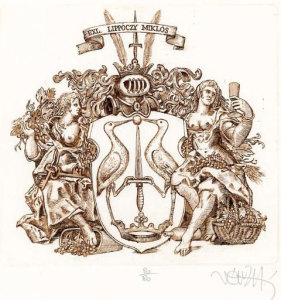
Although in his long life he suffered many personal and community losses, he worked tirelessly in the service of helping others maintain their dignity and find their way to freedom. Truly, he emulated the saints after whom he was named: Nicholas, the patron of children; and Gabriel, the patron of telecommunications. Among his many contribution he was most proud that he was a beloved social worker in the Department of Youth and Family Services in inner city Paterson; Chairman of the Board of the American Hungarian Museum in Passaic, NJ, since 1985; devoted parishioner of St. Stephen’s for over 54 years; executive director for the erection of the monument for Hungarian Freedom Fighters that now graces Passaic Park; republisher of Hungary: The Unwilling Satellite by John Flournoy Montgomery; and a world-class commissioner and collector of international Ex Libris and graphic arts.
On Sunday morning, the 16th of May, 2004 at St. Mary’s Hospital, just as his favorite 11:00 Hungarian Mass at St. Stephen’s was beginning, he closed his eyes for the last time. By no coincidence. In his soul, in his heart, he knew that his friends were gathered together, and so his spirit rose home on the wings of their prayers.
Sometimes a heart has to be broken, to set the soul free. He will live forever in our hearts.
American Hungarian Museum, No. 93, 2005
Eulogy
By Susanna Lippóczy Rich
It is precisely one week, to the moment, that Apuka closed his eyes for the last time. By no coincidence. In his soul, in his heart, he knew that his friends were gathered at his favorite Hungarian Mass — and his heart broke so his spirit could rise home on the wings of our prayers.
I give thanks for his life: that when he was fleeing Hungary, one Good Friday night, when the bombs were whistling all around them, he told jokes all night to the wives and children of military officers, so they wouldn’t be so afraid; that he risked his life that truth and freedom be proclaimed through Hungaria; that for 54 years in America he championed Hungarian culture, art, and history; that for so many years he rescued poor and abused children; that he kissed so many, many hands. And more, and more.
I’m grateful that I had such a father, and for whom he chose as my mother, and that that later led to Lali in my life, who is father and mother at once to me. I’m grateful that my father gave me two sisters, even if, for now, they must be far away.
I am grateful that my legacy and inheritance from him is to spread his enormous lifeforce and love of humanity into the larger world.
I brought everyone a photograph of Apu, to remind us that he is always smiling down on us with love. After Mass, we will gather together to talk about him, to weep together and laugh, and to let his love surround us.
Know that I brought him a bouquet of forget-me-nots from our garden. For five days the beautiful blue spring flowers blossomed for him. They were there in his last days, in his last moments. He never forgot us—ever, ever. And he knew that we would never forget him.
Let us give praise.
